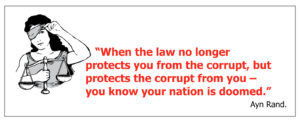If I can be criticised for any “lack of judgement”, it may be for being so naive as to expect that the UN “justice system” was actually an effective legal remedy that could reasonably address mismanagement in the UN.
In the beginning I had complete faith the in the system. I even managed to retain most of that faith until I was at least into my third UNDT application.
 What I actually learned about the UN “justice system” from the experience of having to go through it myself however, was that any staff member relying on any UN tribunal to dispense anything they might recognise as “justice” is – to quote the best line I ever heard on ‘The Big Bang Theory’ – “an object attached to another object by an inclined plane, wrapped helically around an axis.” If you don’t immediately know what that means; it might sound better in latin but the end result is the same, because the fact is that in the UN, even where the Applicant “wins” – the Organization can (and will) make sure that they lose on the long run.
What I actually learned about the UN “justice system” from the experience of having to go through it myself however, was that any staff member relying on any UN tribunal to dispense anything they might recognise as “justice” is – to quote the best line I ever heard on ‘The Big Bang Theory’ – “an object attached to another object by an inclined plane, wrapped helically around an axis.” If you don’t immediately know what that means; it might sound better in latin but the end result is the same, because the fact is that in the UN, even where the Applicant “wins” – the Organization can (and will) make sure that they lose on the long run.
Again; Anders Kompass is to be remembered as a warning to others. After having spent a fortune on the Deschamps Panel, all that the UN had to do was find him a quiet job somewhere and keep him happy for a couple of years until he reached the retirement age – but they couldn’t even do that!
In the UN sadly it is the venal, the vindictive and the corrupt who thrive.
What does the UN “justice system” actually do? That is not a stupid question.
Courts are, understandably and quite rightly, generally reluctant to interfere in the day-to-day decision-making of government departments, but there are occasions when there is cause for them to do so in order to prevent a gross injustice. To achieve that end, there are essentially two major ‘schools’ of Administrative Law in the world today; the English Common Law model and the Civil Law model.
So, quite rightly reflecting that it should not be the role of the judicial branch of government to supervise the day-to-day operations of the administrative branch, the justiciability bar is deliberately set high, but both the English Common Law and the Civil Law models essentially achieve the same thing.
Much of the English Common Law world follow the well known case of Associated Provincial Picture Houses -v- Wednesbury Corporation from whence the legal term of “Wednesbury unreasonableness” comes.
That was a case which involved a local authority making a decision that the plaintiff thought was – to use the vernacular – “totally [expletive deleted] nuts”…. In their judgement, therefore, the Court of Appeal established the legal test to be applied to when a someone sought judicial review of a public authority’s decision on the basis that it was “[expletive deleted] nuts.” The Court of Appeal held that they had the power to investigate the action of the decision-maker (which in that case was an English local authority, but could be any official body):
- with a view to determining whether they have taken into account matters which they ought not to take into account, or, conversely,
- have refused, or neglected to take into account matters which they ought to take into account,
and then having done so,
- have also made a decision which the trial judge described as being in : “…defiance of logic or accepted moral standards that no sensible person who had applied his mind to the question to be decided could have arrived at.”
This was done to limit the courts to reviewing only the most extreme instances of unreasonable decision-making.
‘Wednesbury unreasonableness’ is commonly defined therefore as being much more than just ordinarily or subjectively unreasonable, but the decision in question must be such that no reasonable person, acting in a reasonable manner at the time, could possibly have made that decision. In the vernacular, the learned judges were saying: “Someone would really have to have been off their [expletive deleted] head to have made that decision.”
That was very useful because I was faced with a decision that I (and I believe that reasonable gentleman on the Clapham omnibus) believed to meet the ‘Wednesbury unreasonableness’ test; it was the decision to order an investigation into a satirical comment on a whiteboard….
In the United States – mostly a common law jurisdiction – much of this is governed by constititionality; and challenges to the powers of government are dependent on stautury interpretation, but the constitution specifically embraced the judicial exercise of equity, and the legal system is no stranger to reasonableness.
This is not the test applied, say in France or Germany or other Civil Law jurusdictions. In Europe, there the courts will apply a four-part (or similar) test looking at proportionality and seek to detemine whether:
- there was a legitimate objective for the decision that was made;
- the decision imposed something was appropriate and suited to achieving that objective; and
- that decision was not only necessary to achieve that objective but that that there was not another less onerous way of achieving it
- that decision reasonably balanced the competing interests of the different parties
Again, the European courts are only interested in considering decisions that appear to be quite outrageous. The test is structured so as to exclude all but the most egregiously unjust executive decisions.
Similarly, I would be quite comfortable with the ‘proportionality’ test because I was being investigated for ‘harassment’ for referring to something that a UNDT judge had found to be a fact…..
In the final analysis, in most cases it made no difference whether the Wednesbury unreasonableness test or the European proporionality test is applied; if a decision is ridiculously unjust, the law provides for a judicial review.
So which does the United Nations Dispute Tribunal follow?
A good question.
The answer, of course, appear to be neither.
What is described as an “internal justice system” is a Tribunal whose powers are limited to reviewing procedures, without regard for such inconvenient concepts as fairness, reasonableness or even impartiality.
Moreover, the Tribunal only has power to review a final decision, and not any of the intermediate steps along the way. This, curiously enough, does nothing to deter illegality.
In the real world, an official decision that is fundamentally unreasonable may be challenged and over-turned by the courts. Imagine a government department decided to banish all red-haired women over the age of 18 from living within a mile of a school and resettle them in special gated communities, on the basis that foxy redheads are, by their very nature, a temptation to impressionable young men and could lead to them being distracted from studying for school examinations. There is little doubt the courts would strike down this measure immediately.
Quite apart from being legally, strange, this ‘final decision’ limitation favours the Organization, and condones unethical behaviour on the part of senior UN officials.
 In the disciplinary context, the effect of only being able to challenge a final decision is that the Organisation can initiate an investigation into an individual for a patently punitive motive, lacking any probable cause to do so, and there is nothing the individual can do. The Organisation can proceed to investigate him by the most prejudiced and unfair means, making egregious procedural errors at every step of the way, and cause great harm to the subject’s career as they do so, but he has not legal redress. Then at the very end, by which time the subject may have suffered for a year or more, the ASG/OHRM simply makes a finding that there was no misconduct, or that no disciplinary action is to be taken against him. Only at that stage, after years of suffering, does the aggrieved staff member have the right to challenge a decision in the Tribunal.
In the disciplinary context, the effect of only being able to challenge a final decision is that the Organisation can initiate an investigation into an individual for a patently punitive motive, lacking any probable cause to do so, and there is nothing the individual can do. The Organisation can proceed to investigate him by the most prejudiced and unfair means, making egregious procedural errors at every step of the way, and cause great harm to the subject’s career as they do so, but he has not legal redress. Then at the very end, by which time the subject may have suffered for a year or more, the ASG/OHRM simply makes a finding that there was no misconduct, or that no disciplinary action is to be taken against him. Only at that stage, after years of suffering, does the aggrieved staff member have the right to challenge a decision in the Tribunal.
If this sounds implausible, or it sounds like a theoretical plot that would never happen in reality; ignore the legal challenges to my ‘Graffitti-gate’ case and just consider the Schulenburg case….
Things might not be so bad if retaliation was unusual in the UN. Unfortunately, nothing could be fiurther than the truth. Any staff member who reports misconduct is welcome to do so; he is, in fact, legally obliged to do so, and for doing so, if his report implicates anyone senior, or anyone with good political guangxi than himself, he might as well start looking for another job. At best, he will be kissing his career prospects goodbye, at worst, he will be inviting the Organisation to find some excuse to investigate him, and they will, and the result will be a forgone conclusion.
The reason for that is tied up with the fact that notwithstanding anything the Secretary-General might say on the subject, there is no accountability in the UN. The Organisation disagrees, of course, and insiste that there is; but their definition of the word excludes any prospect of actually holding anyone accountable for a decision that is subsequently found to be illegal, immoral, unethical or unjust.
The cherry on the cake – thanks to the United Nations Appeals Tribunal – is that the whole concept of retaliation against ‘whistleblowers’ in the UN has been rendered nugatory. The “protection mechanism” is about as much practical value as a chocolate fireplace because the right to protection is not a right at all; it is a privilege.
This means that if an ordinary staff member, like Freda the G4 in DGACM, who reports fraud waste or abuse, she runs the risk of that report offending senior management, and senior management can then retaliate against them and ensure they make Freda’s life a misery. Under ST/SGB/2005/21 Freda believes she has a right to protection against retaliation, but in practice that protection is discretionary.
Freda the UN staff member who has suffered retaliation at the hands of senior management, is dependent on the grace and favour of senior management to grant her protection from the retaliation she has experienced at the hands of sen……..
Can anybody else see the problem here?
The UN Appeals Tribunal (clearly not a court that is swayed by any concept of equity) has deemed this so, and this is that the UN Appeals Tribunal now upholds.
As far as the UN is concerned, it is a good system; the Secretary-General gets to appoint the judges who decide on challenges by staff members against decisions made by… well…. by the Secretary-General.
When I crunched the numbers, I found that the decisions of the UNDT were split 50/50; half in favour of the Applicant (the staff member), and half in favour of the Respondent (the Secretary-General.) OK, that’s fine.
What happens next however, is that 75% of judgements against the Secretary-General are appealed, and the Appeals Tribunal decide 75% of those appeals in favour of …… well, oddly enough: the Secretary-General.
The chances of a staff member ultimately being successful in challenging a management decision are 1:8.
In the rest of the world, in order to appeal against a judgement, the aggrieved party needs leave to appeal, and must begin by convincing the judge (or possibly a panel of Appellate judges) that there is some merit to their appeal. The UN does not have such a screening process; the right to appeal is automatic.
That means that the “two-tier justice is system” is not a two-tier system at all, it is one big double whammy system. In addition to the personal stress, it costs the staff member time, effort and often money to pursue a case, the Administrative Law Section do this for a living, it makes no difference to them, and in fact the Organisation benefits by delaying “justice” for several years.
At the bottom of all of this is something that is often forgotten; that these cases are about management decisions, and splitting hairs on arguments of receivability does absolutely nothing to improve what is clearly a bad working situation. At no point is anyone interested in looking into why cases are brought, and what this says about the management style of the party responsible for the decision.
Oh no, that would be navel gazing of the type that the Senior Management Committee just does not do.
The UN prefers to “follow procedure” without thinking.
Thinking is what gets people into trouble.
Legal Advice
When getting litigious, the first thing anyone needs is a lawyer. Litigation is a bit like surgery, no matter how good you are, it is always preferable not to do your own….. and I say that as a lawyer myself.
So, for that purpose (meaning litigation, of course, not surgery) the UN has the Office of Staff Legal Affairs (OSLA). I consulted OSLA when first presented with the first draft of the PIP, had a meeting with the then Head of OSLA, Mr. Brian Gorlick.
I have actually practiced law in the real world, and have an idea of how to behave when approached by a client (or potential client) seeking legal advice. I was not impressed at Gorlick’s summary dismissal of my objections to the PIP, and took a dislike to the way I felt I was being talked down to. I appreciate that a large part of an attorney’s initial dealings with a client involves managing their expectations, which is not only perfectly understandable but also prudent, but I know the difference between legal advice and a line of b/s.
It should not be for me to tell another lawyer how to behave, but Brian Gorlick, who was Chief of OSLA did his best to convince me I had nothing to complain about. There was – he insisted – nothing actionable about that PIP.
I pointed out one aspect of it in particular, that I was being required to sign a PIP that stated: “Do not interject your opinion into a document, especially NTF, reports or any other document which may have to be handed over to the AoJ Tribunal, ALS or OSLA.” Granted, there are two ways of interpreting that, and I may have been fixated on the aspect of withholding information – but Gorlick saw nothing wrong with any of it.
So, here is the Head of OSLA being shown an OIOS document which stated that investigators should not express opinions on documents that were “discoverable” and he was fine with it.
Hold on a minute….. If OSLA’s role is to defend UN Staff members who were facing disciplinary charges after an OIOS investigation, surely the Head of OLSA would be failing to do his job properly if he wanted to disregard information from OIOS that indicated that investigators were being instructed not to put information on the file in order to withhold it from, well from OSLA….
If the roles were reversed and I was Head of OSLA, and an OIOS investigator came to me saying that information was possibly being withheld when it would be relevant to the role that OSLA was supposed to fulfil…… I would be all over that …like a rash! If I was defending a client and the investigator on the case had an opinion on anything about it, I’d want to know what he was expressing an opinion on, and what that opinion actually was. More importantly, I’d want to know why he was being told not to put anything in the file to protect it from legal discovery and I’d want to know what else was being withheld…… because if I was Head of OSLA, I’d want to actually defend the clients I was representing.
Gorlick, however, took a different view, as he is quite entitled to do.
As an investigator, I believe that everything I say, think or do in an investigation should be recorded on the file. It may be relevant to the decision-maker, whether for an exculpatory or inculpatory purpose.
The investigator’s primary role is to find out what happened. When the “investigation” starts to be influenced by external influences and when the investigators get to decide what is relevant and what is not, and what they will disclose and what they will not……you walk in the footsteps of the Gestapo.
That, at least, is what I think. Who cares what I think?
Mr. Gorlick’s role in OSLA was to provide legal advice to UN staff members, and how he did that was up to him. If he was not interested in what information OIOS might have been withholding from him, that was up to him.
Quietly unimpressed with what I had seen and heard, I was about to take my leave when Gorlick dropped the resounding clanger: “How is Michael Dudley?” he asked, “I know him” he added with a smile.
The fact that he should know Dudley was not in itself suspicious. Gorlick had been in charge of OSLA since it was established in 2009, so it was only to be expected that he would have come across Dudley who had been the acting Director of OIOS for most of that time. His comment struck me as strangely inappropriate; I had come in to discuss an OIOS management question. Dudley’s name had never even come up but Gorlick’s jovial banter began to take on a sinister dimension as I got the distinct impression that he and Dudley were, in fact friends.
Both worked as Legal Officers in UNHCR in Geneva in the 1990’s, and I later heard a nasty little rumour that they even shared an office. Oh really? Now Gorlick’s crass dismissal of the points I was concerned with starts to feed the conspiracy theory – which is never a good place to start, but I left that meeting convinced that OSLA was, at best, a waste of time.
I also found myself wondering whether our conversation would remain strictly confidential, and that is absolutely the last thing any client should be concerned about when walking out of any lawyers office. So the question then has to be asked; how many other staff members had been to see OSLA in the past in connection with something involving OIOS, only to be told there was nothing untowards and that they did not have a case worth pursuing? I know of several other OIOS staff members who OSLA were not interested in represtenting.
That’s the trouble with the UN; it is as incestuous as it is incompetent, so while it may not be possible to determine if someone is corrupt or if they are simply stupid. From a practical point of view however, it often doesn’t matter.
The interesting thing about the OSLA is that more staff members prefer to take their chances on their own rather than accept a service that is free. The statistics for 2014 shows how staff members before the UNDT were legally represented, and the DIY option is clearly the preferred choice.
-
OSLA 104
25%
Current or former staff member 9
2%
Private Counsel 53
13%
Self Represented 245
60%
Total:
411
Source: A/70/187. Secretary-General’s Report on Administration of Justice at the United Nations for the biennium 2014-2015. Para 40
It says a lot about their potential clients faith in them that OSLA can only attract one out of every four potential clients. The problem, of course, is that you get what you pay for. OSLA provides free legal services, but whether or not anyone wants to admit it, staff of OSLA know that winning cases that involves highlighting failures or ineptitude by management of the Organization is not exactly the road to promotion in the UN.
One thing was sure; whatever else I might do, I was doing it without OSLA. The stats don’t lie. OSLA provides legal representation that is free; and 75% of UN staff members still don’t want it.
If my own experience is anything to go by; the reasons for that should not really be much of a mystery.